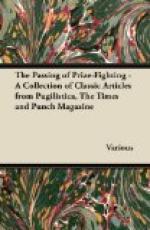DEAR PETHERTON,—I apologise. I had no idea that the animal was in any way connected with your family. If it is a poor relation I must say you are fortunate in being able to fob him (or should it be her?) off so easily, as he (or she) appears to live a life of comparative luxury, at little cost, I should imagine, to yourself. I shall be glad to know whether the animal, in exercising its extraordinary vocal powers, is calling for his (or her) mate, or merely showing off for the amusement of your fascinating poultry who share its pleasaunce.
Can’t you possibly fit the brute with a silencer, as the noise it makes is disturbing, especially to me, my study window being very close to the hedge?
Yours sincerely,
HARRY FORDYCE.
P.S.—I am thinking of laying down a bed of poisoned carrots for early use. Perhaps with your chemical knowledge you can suggest an effective top-dressing for them.
Petherton rose to the bait and wrote—the same night—as follows:—
SIR,—In your unfortunate correspondence with me you have always shown yourself better at rudeness than repartee. Did you not learn at school the weakness of the tu quoque line of argument? You speak of your study window being near my field. The name “study” suggests literary efforts. Is it in your case merely a room devoted to the penning of senseless and impertinent letters to unoffending neighbours, who have something better to do than waste their time reading and answering them? I hope this letter will be the last one I shall find it necessary to write to you.
Re your postscript. Try prussic acid, but pray do not confine it to the toilets of your carrots. A few drops on the tongue would, I am sure, make you take a less distorted view of things, and you would cease to worry over such trifles as the braying of a harmless animal.
Faithfully yours,
FREDERICK PETHERTON.
Of course I simply had to reply to this, but made no reference to the tu quoque question. He had evidently failed to grasp, or had ignored, the rather obvious suggestion in the last few words of my first letter on the subject. I wrote:—
MY DEAR CHAP,—Thanks so much for your prompt reply and valuable information about prussic acid. There was, however, one omission in the prescription. You didn’t say on whose tongue the acid should be placed. If you meant on the donkey’s it seems an excellent idea. I’ll try it, so excuse more now, as the chemist’s will be closed in a few minutes.
Yours in haste,
HARRY F.
Petherton was getting angry, and his reply was terse and venomous:—
SIR,—Yes, I did mean the donkey’s. It will cure both his stupid braying and his habit of writing absurd and childish letters.
But if you poison my donkey it will cost you a good deal more than you will care to pay, especially in war-time.




